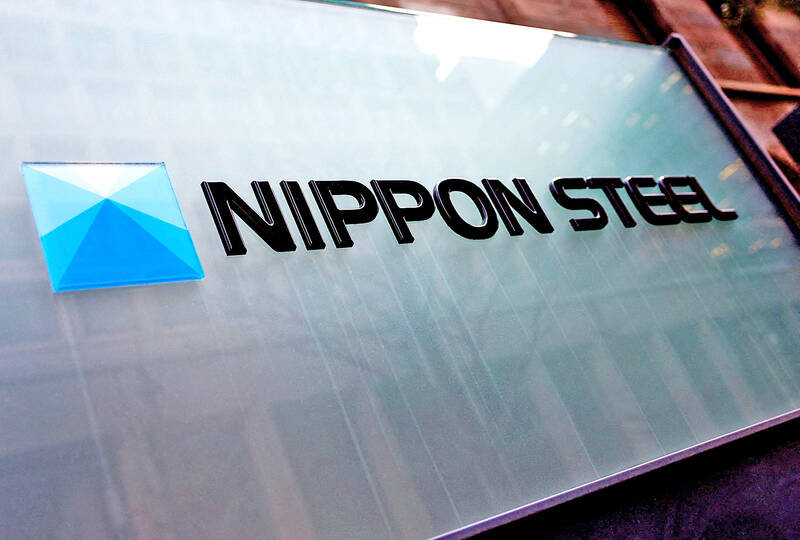Turkey imposed anti-dumping duties on some steel imports from China, Russia, India and Japan, an Official Gazette announcement said yesterday, with the highest tariffs on Chinese imports, boosting stocks of flat steel producers.
The duties affect some 4 million tonnes of imports with a value of some US$2 to US$2.2 billion, Turkish Steel Producers Association (TCUD) secretary general Veysel Yayan said.
The duties range from 6.10 percent to 43.31 percent of cost, insurance and freight prices in a move aimed at preventing unfair competition after appeals by domestic producers, the announcement said.

Photo: Reuters
Ankara’s decision comes amid rising trade tensions between China and the EU over tariffs on electric vehicles, brandy and other goods, and follows China’s complaint to the World Trade Organisation on import duties imposed on Chinese electric vehicles entering Turkey.
An investigation into hot rolled steel imports following domestic producers’ appeals showed that the alleged dumping of steel threatened to damage domestic production, said the Official Gazette, a state journal that publishes new legislation and other announcements.
Shares of Turkish steel producer Erdemir rose as much as 2.48 percent after the announcement, trading up 2.11 percent at noon local time. Isdemir was up 2.2 percent.
“We view this development as positive for hot-rolled flat steel producers, particularly Isdemir and Erdemir,” brokerage Deniz Yatirim said in a note, adding that it could have a supportive effect on sentiment for stocks in other sectors.
TCUD’s Yayan said he expected the capacity utilization rates of domestic producers to increase after the imposition of the anti-dumping duty on hot-rolled flat steel imports.
Duties imposed on imports from China range from around 15 percent to 43 percent, and tariffs imposed on imports from Russia, India and Japan range from 6 percent to 9 percent, according to the decision.

When an apartment comes up for rent in Germany’s big cities, hundreds of prospective tenants often queue down the street to view it, but the acute shortage of affordable housing is getting scant attention ahead of today’s snap general election. “Housing is one of the main problems for people, but nobody talks about it, nobody takes it seriously,” said Andreas Ibel, president of Build Europe, an association representing housing developers. Migration and the sluggish economy top the list of voters’ concerns, but analysts say housing policy fails to break through as returns on investment take time to register, making the

NOT TO WORRY: Some people are concerned funds might continue moving out of the country, but the central bank said financial account outflows are not unusual in Taiwan Taiwan’s outbound investments hit a new high last year due to investments made by contract chipmaker Taiwan Semiconductor Manufacturing Co (TSMC, 台積電) and other major manufacturers to boost global expansion, the central bank said on Thursday. The net increase in outbound investments last year reached a record US$21.05 billion, while the net increase in outbound investments by Taiwanese residents reached a record US$31.98 billion, central bank data showed. Chen Fei-wen (陳斐紋), deputy director of the central bank’s Department of Economic Research, said the increase was largely due to TSMC’s efforts to expand production in the US and Japan. Investments by Vanguard International

WARNING SHOT: The US president has threatened to impose 25 percent tariffs on all imported vehicles, and similar or higher duties on pharmaceuticals and semiconductors US President Donald Trump on Wednesday suggested that a trade deal with China was “possible” — a key target in the US leader’s tariffs policy. The US in 2020 had already agreed to “a great trade deal with China” and a new deal was “possible,” Trump said. Trump said he expected Chinese President Xi Jinping (習近平) to visit the US, without giving a timeline for his trip. Trump also said that he was talking to China about TikTok, as the US seeks to broker a sale of the popular app owned by Chinese firm ByteDance Ltd (字節跳動). Trump last week said that he had

STRUGGLING TO SURVIVE: The group is proposing a consortium of investors, with Tesla as the largest backer, and possibly a minority investment by Hon Hai Precision Nissan Motor Co shares jumped after the Financial Times reported that a high-level Japanese group has drawn up plans to seek investment from Elon Musk’s Tesla Inc to aid the struggling automaker. The group believes the electric vehicle (EV) maker is interested in acquiring Nissan’s plants in the US, the newspaper reported, citing people it did not identify. The proposal envisions a consortium of investors, with Tesla as the largest backer, but also includes the possibility of a minority investment by Hon Hai Precision Industry Co (鴻海精密) to prevent a full takeover by the Apple supplier, the report said. The group is